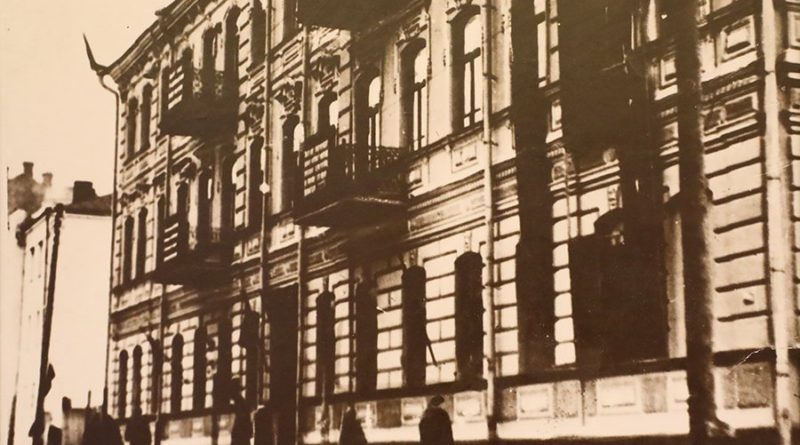The Belarusian Academy of Sciences building which housed the Library in the 1930s-1940s. Source: Central Scientific Library of Yakub Kolas of the Belarusian Academy of Sciences
The short version of the article is published: Наука и инновации, 2020, май, №5 (207). С. 72-77.
Each institution has, during its history, decisive periods that perpetuate its very existence, despite all the hardships that accrued to its destiny. In the history of the Central Scientific Library of Yakub Kolas of the Belarusian Academy of Sciences, the years 1929-1941 witness an explosive structural development and colossal accumulation of holdings notwithstanding the pressure from the Communist Party that begins to become more and more violent.
The Library of the Belarusian Academy of Sciences is heir to the Inbelkult Library (Инбелкульт – Институт белорусской культуры / Institute of Belarusian Culture), legendary institution that existed in Belarus from 1922 to 1928. A terrible fate awaited the members of the Inbelkult, founders of the Belarusian history and exceptional cultural figures: most of them fell victims to mass repressions carried out on false charges in the early 1930s.
Alexandre Hruša’s article looks at those difficult years when Inbelkult became the Academy of Sciences. Then, Dmitry Dovgyallo was appointed director of the Library. D. Dovgyallo was known as historian and archivist during the time of the Russian Empire: he graduated from the Theological Academy of St. Petersburg, and held the rank of state councillor. Later, he became the editor of the famous books of the civil registers of the provinces of Vitebsk and Mogilev (Belarus) from the end of the 16th to the beginning of the 18th centuries. In early Soviet years, he was a fellow of the Inbelkult. In 1929 D. Dovgyallo became the director of the Library of the Belarusian Academy of Sciences.
Alexandre Hruša demonstrates how, despite increasing pressure from the Communist Party, in the circumstances of post-revolutionary devastation, the Library administration increases its holdings and book collections, starting from zero to reach 150 000 exemplars in 1936. The Library subscribes to numerous scientific journals and send its publications abroad, all this in a context of opposition between the intelligentsia, namely the Inbelkult members, on the one hand, and the Soviet authorities on the other. Their relationship, initially concordant on the question of the transformation of the Inbelkult into the Belarusian Academy of Sciences, became particularly tense in the early 1930s. Romantic dreams about the future of Belarus, professional devotion to the Belarusian people of the Inbelkult prominent figures, as well as the scope of their research, could not match the Party’s ideas about the allegedly “scientific” struggle against so-called “bourgeois” theories and tendencies, “hostile to the proletariat”. The authorities feared that the Inbelkult members might find themselves leading the opposition movement. Initially resigned to coexistence with the Inbelkult, the authorities quickly moved on to persecution and then physical repressions against its fellows.
The article shows the nature of accusations, methods, rhetorical and ideological techniques that the Party used against the intelligentsia of the Inbelkult and of the Belarusian Academy of Sciences: the documents cited here, employ the terms “opportunist nationalist leadership” (Inbelkult), “national democratic counter-revolutionaries”, “nationalist-interventionist restoration, bourgeois research”, “counter-revolutionary sabotage”.
The repressions affected not only men, but also books. As the year of the Great Terror approached, the wave of persecutions destroys a significant part of the Belarusian intelligentsia, the Library also loses a great part of its holdings, as result of the so-called “purges” carried out against “sabotage” in the sciences. “The secret department” and “the sabotage literature department” are created. The Party obliges the management of the Library to create a special commission responsible for permanent checking the “loyalty” of publications, especially in the case of books written by “enemies of the people”.
Dmitry Dovgyallo did not escape the fate of a large part of the Belarusian intelligentsia: he was arrested in 1937 and died in exile in 1942.
The article shows by what dramatic process the Library of the Belarusian Academy of Sciences, the metaphor of the Belarusian intelligentsia, sets out on the path of self-destruction.
Read the full text of the article in Russian: Александр Груша. Библиотека Белорусской академии наук (АН БССР) в 1929–1941 гг. Новый этап роста и первые утраты
